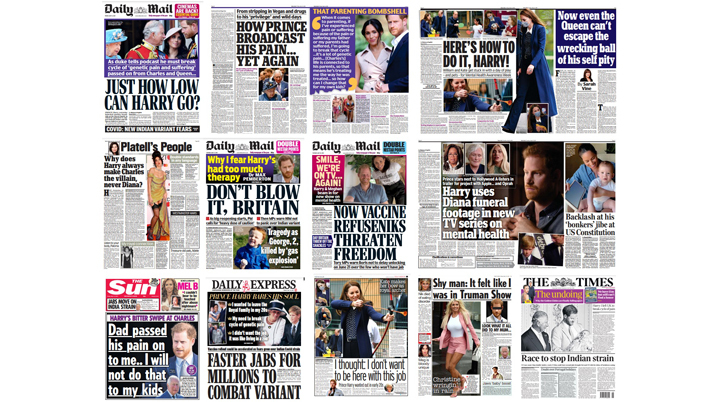
Harry the Great (page filler)
“Harry, stop talking. Pipe down. Quit chattering. Put a sock in it. Shush!” urged Celia Walden in Tuesday’s Telegraph. Most Fleet Street columnists, stirred into action by the Duke of Sussex’s latest utterings, agreed. He had been cruel, petulant, self-pitying, whingeing, spoilt and more, depending on which of the daily prints landed on your doormat.
But do our papers really want him to shut up? He just fills so much space. The Mail, as ever, led the charge with its “Just how low can Harry go?” splash, running into four pages inside before any other subject got a look in. The Sun also led on the story, while the Times and Express gave it a big chunk at the top of their fronts. The Telegraph preferred its favourite duchess trying archery to the troublesome duke trying to protect Archie and consigned Harry to the briefs at the bottom of the page.
Kate – with William in tow – was at a Wolverhampton youth club as part of Mental Health Awareness Week. “Here’s how to do it, Harry!” the Mail said approvingly, while the adjacent heading on Sarah Vine’s column bemoaned “the wrecking ball of his self-pity”. The main headline on the previous page was “How Prince broadcast his pain…yet again”.
Talking openly
Now here’s a thing. About a quarter of Britons suffer from mental health problems, the availability of help is patchy and, for all the fine words from politicians and corporate wellbeing pamphlets, a stigma remains. The key thing mental health charities want to encourage is for people to talk openly.
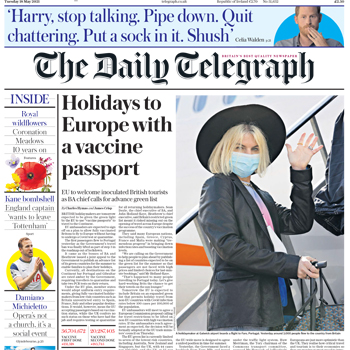
And that’s what Harry did, in a measured and thoughtful conversation for the Armchair Expert podcast, whose brief was “to discuss how to approach mental health issues, growing up with privilege…how people can change their mindset…and how much more important mental health is than physical health.”
In speaking as he did, Harry did far more to reassure sufferers all over the world that they are not alone – that anxiety, depression and stress do not discriminate between privilege and poverty – than any amount of guinea pig cuddling by Kate. But she is praised while he is pilloried.
I had thought that even the Neanderthals and dinosaurs had grasped that the one thing you don’t say to someone with these sorts of issues is “Pull yourself together. What have you got to be miserable about? There are millions worse off than you.”
Yet for six successive days, that is exactly what Fleet Street pumped out; telling Harry how much he’s hurting his family, demanding that he be stripped of his titles, mocking him for his upcoming AppleTV+ mental health documentary series – it involves Oprah and has “Me” in the title, so is obviously bad. Thank heavens for Oliver Kamm, a man who suffered a severe mental disorder and wrote a serious book about the recovery process, bringing a bit of knowledge rather than knee jerks to the debate in The Times yesterday.
He concluded that, while it was a bit rum of Harry to drag the rest of the family through the wringer, the Prince was doing more good than harm.
Like father, like son
It was inevitable that news organisations would home in on what they interpreted as his attack on Prince Charles, the Queen and the Duke of Edinburgh, but it took until Tuesday for anyone – the Telegraph as it happened – to acknowledge that Charles had done pretty much the same thing in 1994, In a series of interviews for an authorised biography, he told Jonathan Dimbleby that his father had been “harsh” and “hectoring”, that his mother had been “distant”, and that he blamed Philip for sending him to Gordonstoun, where he was bullied, and for forcing him to marry a woman he didn’t love.
These, surely, were the experiences Harry was referring to when he spoke about “breaking the cycle”; the message being that since his father had been unable to do it from within the confines of the Royal Family, he was going to try to do it from outside.
We may think that if Harry and Meghan are so keen on their privacy, they should stop talking, pipe down, put a sock in it. But even though they are no longer “senior royals”, they are still public figures with the power to raise awareness of issues such as racism and mental health. Like anyone, they have the right to speak. That doesn’t mean we have to listen or that the Press has to print page after page (60+ at the last count) about them. Newspapers don’t slavishly churn out and analyse every word Keir Starmer or Rishi Sunak or Ed Davey utters. They pretend they do it with the Sussexes because it “affects the monarchy”. That’s rubbish. They do it because it sells papers.
Harry did far more to reassure sufferers all over the world that they are not alone … than any amount of guinea pig cuddling by Kate.
Don’t mention the court case

As we all know, the Duchess of Sussex took the Mail on Sunday to court for breach of copyright over publication of a letter she had written to her father. And won. The paper was ordered to publish a front-page statement about its defeat, but has appealed and so it has yet to appear. That ruling was made just before the Oprah interview. On the following Sunday, the day the interview was to be aired, the MoS ran 14 pages on the couple and their “sideshow”, but did not report the front-page edict.
Maybe it thought it didn’t need to, since it was appealing and so the matter wasn’t closed. I’m sure we’ve all noticed how newspapers never publish the results of trials for murder, criminal damage, robbery and the like because the convicted defendant plans to appeal.
Last week, Mr Justice Warby issued a written explanation of why he had found in the Duchess’s favour without going to a full trial. The Mail’s owners, Associated Newspapers, had claimed that the couple’s former communications secretary – Jason Knauf – had co-authored the letter, which meant it technically belonged to the Crown. Knauf said that he had made one minor suggestion, but had no part in drafting the letter – and, anyway, he was not a servant of the Crown. This “unequivocal and definitive” assertion, the judge said, rendered Associated’s claim “unreal”, so that there would be no chance of the Duchess losing her case at a full trial.
The judge also said that it was not unreasonable for the paper to have mounted a defence on the basis that it believed Knauf had been more involved in the letter-writing and rejected the Duchess’s claim that it had acted dishonestly in doing so. He added, however, that in refusing for three weeks to accept that Knauf’s denial had put paid to its case, Associated had acted “outside the norm” and would, as a result, have to pay more costs when these were finally decided in October.
Only the Telegraph reported the ruling at any length – focusing on the judge’s description of the whole case as being “tortuous” and full of twists and turns. The Daily Mail gave it a single column on page 21 under the headline “How aide helped Meghan win court battle”, an interesting spin on “How aide destroyed Mail’s defence”.
And the Mail on Sunday? Three pages plus a Sarah Vine column on the Harry betrayal and a “storm over deal with firm that sells ‘racist’ whitening cream”, but not a word about the court case.
This “unequivocal and definitive” assertion, the judge said, rendered Associated’s claim “unreal”.
Not so exclusive

They say good news doesn’t sell, but that doesn’t seem to deter some of our papers. The Express is definitely of the glass three-quarters full persuasion, long telling readers about how life is going to be spectacularly rosy tomorrow. Now The Sun has caught the habit. But its timing could have been better.
Boris Johnson laid out his “roadmap” out of lockdown in February, complete with target dates, from schools reopening on March 8 to “back to normality” on June 21. These dates were spelt out on every front page. There was a reason for the gaps between the staging posts: to make sure that there was no surge in infections before moving to the next one. So, no date could be confirmed until a week or so before – thus we were told on the 10th that indoor hospitality would open as planned on the 17th.
It was baffling, therefore, to see The Sun’s “Great British mask off” splash last Thursday. Social distancing and mandatory face coverings would go on June 21 it said. But we’d known since February that that was the ambition. If it looked as though that wouldn’t happen, it would have been a story. But “Nothing’s changed, everything going to plan” is not news. Any more than it was news the previous Wednesday when the i splashed on “UK holiday list is out on Friday”.
As it happens, it was the i that hammered home the problem with the Sun’s “mask off” front page that very day, when it led with “Fears for end of lockdown after variant cases triple”.
Sure enough, the next day the Prime Minister “levelled” with us and said that, while Monday’s opening up would go ahead, the rapid spread of the Indian variant might throw plans for total freedom off course.
To be fair, the Sun splashed on that too. With a different byline from the earlier “exclusive” that was not only not exclusive, but also wrong.
“Nothing’s changed, everything going to plan” is not news.
On-point puns
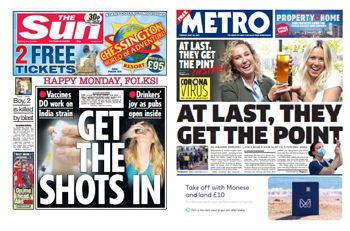
Still with Covid, The Sun fared better on Monday with a smart pun that actually worked – tying together the campaign to persuade people to get a jab with the re-opening of indoor service in pubs.
The Metro produced a similarly neat take on the same idea the next day, this time with two headlines that were identical but for a single letter.
Very pleasing on both counts.
Maddie: on front pages again, but (sadly) no news
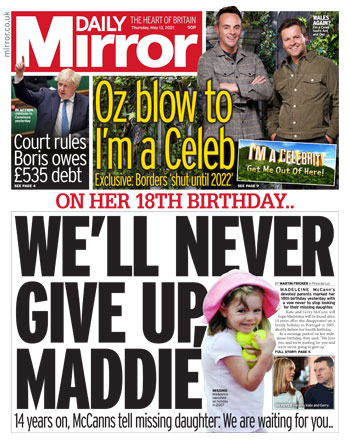
Madeleine would have been 18 last week. It is more than 14 years since she disappeared from her holiday villa in the Algarve, almost certainly taken and murdered by a man now in jail in Germany for rape. It was natural for Kate and Gerry McCann to mark their lost daughter’s landmark birthday. And it was inevitable that the Maddiemaniac Express and Mirror should seize on the opportunity to put that pink hat picture on their front pages. They both headlined on the parents’ “We’ll never give up” pledge.
The Sun, too, used the pink hat photo in the puff, claiming “Cops in new Maddie clue”. Really, on the very day of her birthday? What a coincidence.
No. Not really. Instead of going for the family memory stuff, Nick Pisa had the wit to ring the German prosecutor to see how things were coming along. He said investigators had gathered new circumstantial evidence that was helping them to build the case, but he couldn’t say what it was.
This was apparently enough to justify a headline “Maddie tip-off to nail suspect” and an intro declaring that there was “dramatic new evidence”.
So, rather like the “mask off” splash under the Madeline puff, it was a case of “no change here”.
I have a sneaking admiration, however, for the little bit of enterprise involved in producing that “story”. Madeleine has made a front page appearance on the Express or Mail, whether to mark her disappearance or birthday, virtually every May since 2007. It is a cynical use of tragedy to drive sales and, until there is a real development in the case, it should stop.
Rather like the “mask off” splash under the Madeline puff, it was a case of “no change here”.
Brits abroad
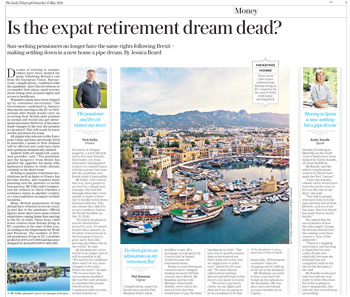
“Is the expat retirement dream dead?” the Telegraph Money section asked on Saturday. Families who had hoped to settle in Europe were having their hopes dashed. Obstacles included new British pension rules and the Covid travel ban that prevented some from establishing residency before our divorce with the EU became absolute in January. There have been many of these stories through all the ups and downs of the Brexit negotiations and they have one thing in common: the Brits involved are always referred to as “expats”.
Isn’t it strange how people from other countries come to live here are always “migrants” or “immigrants”, while Britons who go to live overseas never are?
Liz Gerard’s Notebook is a fortnightly column published in the InPubWeekly newsletter. To be added to the mailing list, enter your email address here.












